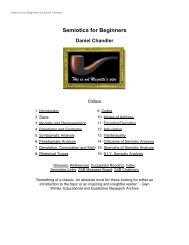Semiotics for Beginners by Daniel Chandler
Semiotics for Beginners by Daniel Chandler
Semiotics for Beginners by Daniel Chandler
Create successful ePaper yourself
Turn your PDF publications into a flip-book with our unique Google optimized e-Paper software.
<strong>Semiotics</strong> <strong>for</strong> <strong>Beginners</strong> <strong>by</strong> <strong>Daniel</strong> <strong>Chandler</strong><br />
Metaphor<br />
Metonymy<br />
Synecdoche<br />
Irony<br />
sensorimotor stage (birth<br />
to about 2 years)<br />
pre-operational stage (2 to<br />
6/7 years)<br />
concrete operations stage<br />
(6/7 to 11/12 years)<br />
<strong>for</strong>mal operations stage<br />
(11/12 to adult)<br />
epochs<br />
Renaissance period<br />
(sixteenth century)<br />
Classical period (seventeenth<br />
and eighteenth centuries)<br />
Modern period (late<br />
eighteenth to early twentieth<br />
century)<br />
Postmodern period<br />
Michel Foucault undertook an 'archeological' study of three loosely defined historical periods: the<br />
'Renaissance' period, the 'Classical' period and the 'Modern' period. He argued that each period had<br />
an underlying epistemology. White suggests that each of these periods, together with the Postmodern<br />
period in which Foucault wrote, reflects one of the four master tropes in White's suggested sequence<br />
(White 1978, 230-60). Elsewhere he argues that in Foucault, 'every "discursive <strong>for</strong>mation" undergoes<br />
a finite number of... shifts be<strong>for</strong>e reaching the limits of the épistème that sanctions its operations. This<br />
number corresponds to the fundamental modes of figuration identified <strong>by</strong> the theory of tropology:<br />
metaphor, metonymy, synecdoche and irony (which is here understood as self-conscious<br />
catechresis)' (White 1979, 95). Cathachresis is variously defined, but it is based on the notion of an<br />
abusive comparison.<br />
Foucault himself speculated about a sequence of tropes, although this is not the same sequence as<br />
that proposed <strong>by</strong> White. He related this to the development of writing and language in a three-part<br />
sequence from synecdoche to metonymy to catachresis or metaphor. This is reminiscent of the<br />
speculations of Peirce about the evolution of language from the indexical and iconic towards the<br />
symbolic (Peirce 1931-58, 2.299, 2.92, 2.90, 2.280, 2.302).<br />
True writing began when the attempt was made to represent, no longer the thing itself, but one<br />
of its constituent elements, or one of the circumstances that habitually attend it, or again some<br />
other thing that it resembles... These three methods produced three techniques: the<br />
curiological writing of the Egyptians... which employs 'the principal circumstance of a subject in<br />
lieu of the whole' (a bow <strong>for</strong> a battle, a ladder <strong>for</strong> a siege); then the 'tropal' hieroglyphics...<br />
which employ some notable circumstance (since God is all-powerful he knows everything and<br />
sees all that men do: he is there<strong>for</strong>e represented <strong>by</strong> an eye); finally symbolic writing, which<br />
makes use of more or less concealed resemblances (the rising sun is expressed <strong>by</strong> the head<br />
of a crocodile whose round eyes are just level with the surface of the water). We can recognize<br />
here the three great figures of rhetoric: synecdoche, metonymy, catachresis. And it is <strong>by</strong><br />
following the nervature laid down <strong>by</strong> these figures that those languages paralleled with a<br />
symbolic <strong>for</strong>m of writing will be able to evolve...<br />
In any representation, the mind can attach itself, and attach a verbal sign, to one element of<br />
that representation, to a circumstance attending it, to some other, absent, thing that is similar




